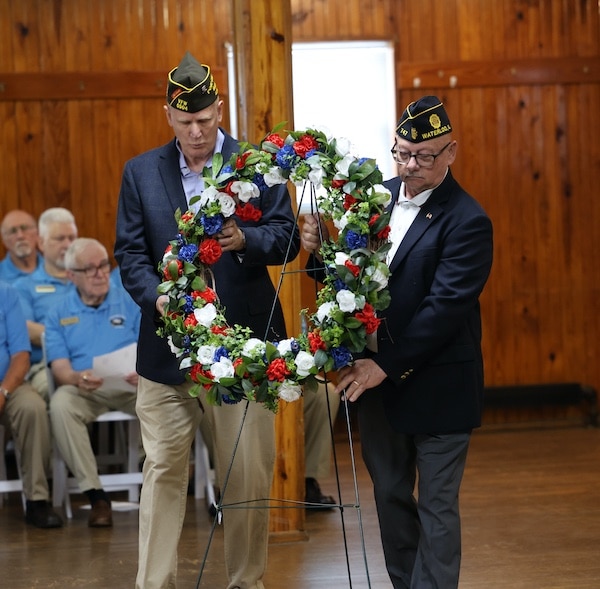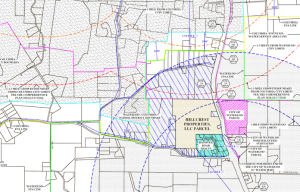County gathers for those who gave everything

Decoration Day was first officially celebrated in 1868, though its origins can be traced back even further to a number of tributes and observances organized by communities wishing to recognize their fallen soldiers.
With over a century and a half passed – and an official name change to Memorial Day in 1971 – the tradition continues, and Monroe County showed once again this year how impactful it is for a community to gather in remembrance of those who have been lost in service to their country.
In Waterloo the annual ceremony organized by Waterloo’s VFW and American Legion posts on the grounds of the Monroe County Courthouse was instead moved inside Metzger-Crook VFW Post 6504 out of concern for poor weather.
Post 6504 Commander Mike Douglas conducted the call to order and the placing of the colors, and the Kaskaskia Trail Chorus continued the ceremony with the national anthem.
Pastor Mat Whitaker with First Baptist Church of Waterloo gave the invocation, and Brenda Johnson with Post 6504 Auxiliary then performed as a soloist, leading the crowd as she performed the first verse of “God Bless America” a second time.
Following was the placing of the flag by Douglas, who was then joined by Post 747 Commander Clyde Heller during the placing of the wreath.
Heller served as the master of ceremonies for the event, going on to read General Order No. 11, given by John A. Logan in 1868 to establish Decoration Day.
“The 30th day of May, 1868, is designated for the purpose of strewing with flowers or otherwise decorating the graves of comrades who died in defense of their country during the late rebellion, and whose bodies now lie in almost every city, village, and hamlet churchyard in the land,” Heller recited. “In this observance no form or ceremony is prescribed, but posts and comrades will in their own way arrange such fitting services and testimonials of respect as circumstances may permit.”
It was at this point in the ceremony that the Waterloo Municipal Band would typically perform live, though, with the event confined to the main hall of the VFW, the crowd instead enjoyed a recording of the “Armed Forces Salute,” each veteran standing as the song of their respective service branch played.
Heller then introduced the speakers for the event, the first of whom was Douglas, who spoke briefly as he voiced his appreciation for the strong attendance and remarked on the struggles that veterans who return from combat so often face.
“I just want to thank everybody for coming out and showing support for such an important day, taking time out of your day to honor those veterans who gave the ultimate sacrifice,” Douglas said. “Many times we forget that this ultimate sacrifice isn’t just the people who didn’t make it back home, but it’s people who came back home and succumbed to the injuries and illness that they bore defending our freedom and freedom across the world.”
Next to speak was VFW Post 6504 Auxiliary President Carol Schilling, who simply recited “The Fallen,” a poem by Randall West.
Waterloo Mayor Stan Darter, also a veteran, then spoke, his speech placing special attention on the history of the VFW hall.
“This building was finished in around 1952, a place for VFW members to meet with each other and to remember friends and family that paid the ultimate sacrifice for our country,” Darter said. “Since its opening, there have been many more wars and conflicts that have taken additional lives for us to commemorate today. Also since the VFW opened, there have been countless weddings, receptions, dances, bingo, fish frys and funeral lunches. Each one of those events have been held inside the walls of this hall built by veterans and volunteers.”
Darter further remarked that the original builders of the hall would be quite proud of the care and respect with which it is frequently used to this day.
He also commented on the state of Waterloo and the county and their distinct appreciation for veterans in the area.
“The city of Waterloo and Monroe County have deep roots paying tribute to our service members both past and present, from our annual tradition of placing flags on the graves of soldiers to the everyday occurrence of hearing the phrase ‘Thank you for your service,’” Darter said. “Those service members that we have gathered to remember today would be overwhelmed to see everyone here. Thank you for taking the time to attend.”
The guest speaker for Waterloo’s ceremony was State Representative David Friess, who served as an aircraft mechanic in the U.S. Air Force.
Friess thanked those in attendance and touched on his own connection to the hall. Having lived in Waterloo for a time after his service, Waterloo’s was the first VFW he joined, enjoying many fish frys and other events there.
His speech continued with a reflection of Memorial Days’ meaning and importance.
“Memorial Day is an occasion for both grief and celebration,” Friess said. “We reflect on the tragic loss of life and recount the courageousness of those who have served in the military. For those who have served, the day holds the utmost significance by giving our country the opportunity to pay tribute and remember the lives that have been lost in defense of our nation.”
Friess further discussed the importance of memories and how it is the duty of every American to tell the stories of fallen veterans so their memory can live on.
“We single out this day to recognize and honor their contributions, but this should not be a single-day event,” Friess said. “We should remember them every day when we say our morning and evening prayers. We should share their stories with everyone we encounter. We should share their stories of duty, loyalty and courage, these American values of our fallen heroes.”
Getting somewhat emotional in the middle of his speech, Friess recalled a quote from “Saving Private Ryan” said by the movie’s title character as he visits his the grave of the man who died rescuing him, “I hope that, at least in your eyes, I’ve earned what all of you have done for me.”
Friess then continued the sentiment.
“Every day, we should earn the respect that these men and women have paid the ultimate sacrifice so that we live free like no other country,” Friess said.
Following Friess’s presentation, the ceremony continued with Johnson performing “Amazing Grace.”
Then came the placing of the flowers, with Schilling speaking on the purity represented by the white flower, VFW Auxiliary Sr. Vice President Hazel Moeckel describing how truth and fidelity is represented by the blue flower and Auxiliary Jr. Vice President Sharon Kirksey explaining how the red flower represents love.
The Kaskaskia Trail Chorus then performed the Lord’s Prayer, which was followed by a benediction from Whitaker and a salute to the dead by the Post 6504 Firing Squad outside the hall.
Taps was performed by Bugler Russ Wolf.
In Columbia, Memorial Day was once again hosted by American Legion Post 581 and Auxiliary with music courtesy of the Belleville Community Band.
After a welcome by Post 581 Commander Greg Smith, greeting from Columbia Mayor Bob Hill and the Memorial Day thoughts and remembrances of Columbia Auxiliary President Clara Schaefer, former Columbia High School Principal and local historian Dennis Patton shared a history of Memorial Day and the American Legion.
The number of military personnel who died during active duty varies based on what data is included.
For instance, while the number of combat fatalities during the Revolutionary War are listed as approximately 6,800, about 17,000 Colonial soldiers also died from malnutrition or malaria, smallpox and other diseases during the course of the war.
Other calculations include active duty service members who died as a result of non-combat injuries or other causes not involving military service
Regardless of how they are counted, more than one million people have died while actively serving in one of the country’s military branches or reserve units.
Patton began by pointing out nearly half of all casualties – over 500,000 – are a result of the Civil War, with some estimates claiming 650,000 deaths as a result of that conflict.
One year after the war ended, community-led efforts in Georgia were organized in 1866 to decorate the graves of fallen Civil War veterans, with a more widespread recognition the following year on May 30.
In 1868, General John A. Logan of the Grand Army of the Republic led decoration of about 20,000 graves at Arlington National Cemetery in Virginia, proclaiming May 30 as the inaugural Decoration Day nationwide.
During the next major conflict involving the United States, World War I, many of the 116,000 fallen American soldiers were interred in temporary cemeteries throughout Europe.
Patton explained the tradition of National Poppy Day, now observed the Friday before Memorial Day, was begun as a way to remember those fallen soldiers.
“A University Georgia professor vowed to wear a poppy every day in memory of those who died, giving birth to the tradition,” Patton said.
The poppy is a reference to the poem “In Flanders Field,”
written by a Canadian physician describing poppies growing throughout the site of a WWI battlefield cemetery in Belgium.
At the conclusion of the “Great War,” the American Legion was founded in France as an organization dedicated to helping prepare soldiers to return to the United States.
Patton said the mission of the American Legion today is to honor veterans and fallen military personnel, teach Americanism, support youth and host ceremonies to recognize Memorial Day and other military-related observances.
The Columbia American Legion was founded in 1920 by 24 members who met in the “old Turner Hall,” Patton continued.
Shortly after, the Columbia American Legion Auxiliary was formed, and in 1922 funds were raised to commission the Doughboy Statue which currently rests at the entrance to Post 581.
Patton shared its full name, “The Spirit of America Doughboy Statue,” adding it originally stood along Main Street.
“That statue represents all of the men and women who fought, and those who died, in all of our world wars,” Patton said.
During World War II, Patton noted over 400,000 United States military personnel died in Europe, Asia, Africa and Pacific theatres, many of them being laid to rest in overseas cemeteries.
After WWII, the term “Memorial Day” began to be used instead of Decoration Day.
In the late 1960s, an act of Congress created the Uniform Monday Holiday Act, which moved commemoration from May 30 to the last Monday in May.
The act, which went into effect in 1971, also officially renamed the holiday as Memorial Day.
While Memorial Day is meant to honor the dead, Patton suggested “a fitting way to honor (the dead) is also to honor those who are serving and who have served,” of which Patton said there are over 18 million alive in the United States today, including 1.3 million active military personnel and 800,000 reservists.
To accomplish this end, Patton said those not in military service can “pick a noble purpose, and we can strive to serve our fellow man and our country in any way we can.”
Patton then recalled his childhood in the 1950s as a very patriotic time in the United States, describing extravagant Memorial Day parades and celebrations.
He also recalled the “heroes” of 1950s Saturday morning television whom Patton and his friends emulated during play time.
Patton said his father, a “half-track gunner” who served in Iwo Jima, “never talked about” his wartime experiences except perhaps with fellow servicemen during one particular Memorial Day picnic.
Patton recalled approaching the group of veterans after the parade, calling them heroes like the ones on television, and pointing out the praise they received during the parade.
His father responded, “We weren’t heroes. We went because we had to. We served our country because we felt we needed to, but those who didn’t come back were the heroes.”
Not understanding what his father meant, a young Patton looked up the definition of a hero and found, “uncommon behavior for a noble purpose” in the dictionary.
“A philosopher once said that a hero is someone who can see what is in front of him – glory and danger – and still goes out to meet the challenge,” Patton continued. “Those of you that served and all that passed away lived the meaning of being a hero, and you are to be honored for that.”
In closing, Patton wished the country would “never run out of selfless men” or “grateful, supportive people who are willing to remember the sacrifice that those who gave their lives paid for our country… We can ensure the future generations understand the importance of service, sacrifice and honor.”
Following Patton’s, the Belleville Community Band played the Armed Forces Salute, during which veterans stood to salute the flag of their respective branch as its service song was played.
The ceremony concluded outside at the Doughboy Statue where Hill and Patton laid a wreath on the statue, and the Post 581 Honor Guard sounded a rifle salute during a playing of taps.
Valmeyer also held its annual Memorial Day observance at American Legion Post 901, with the ceremony beginning with a performance of the national anthem by Terrie Thies.
An opening prayer and closing benediction was offered by Post 901 Chaplain Leon Wirth, and Post 901 Commander Charles Asselmeier conducted the ceremony.
Auxiliary President Mary Asselmeier, joined by Auxiliary Treasurer Mary Ann Henke, presented a tribute to the dead, followed by musical performances by Bristol and Brooklyn Ahrens and Thies.
U.S. Marine Corps Veteran Micah Carr served as the guest speaker for the event, having served from 2007-2015 with two deployments to Iraq.
Carr spoke about the importance of remembering those who sacrificed for their country, also remarking on the sacrifices many made even as they returned home.
“War teaches you how fragile life can be,” Carr said. “It also teaches you the strength of the human spirit and what it means to lay down your life so someone else can go home. The people we honor today understood that. They answered the call with great pride. For those who came home, their battle didn’t end when they left the war zone. For many, the weight of war followed them home.”
Carr furthered this point by touching on the severe problem of veteran suicides, concluding by saying, “Let’s live each day like we remember what they gave us so we can live our lives in freedom.”






